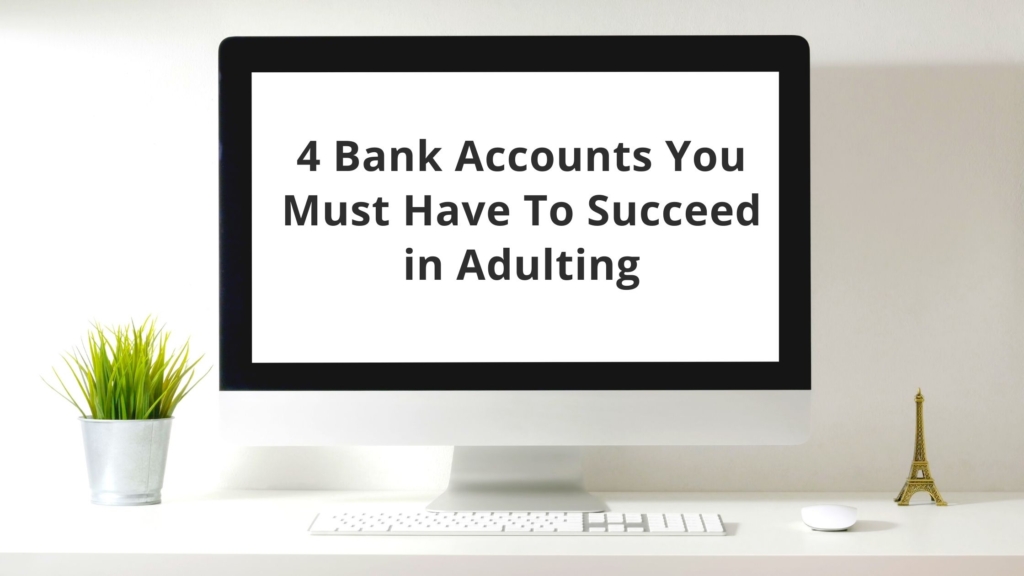This post contains affiliate links, which means I get paid a commission when you purchase through my link. Please read full disclaimer here.
1. CHEQUING ACCOUNT
Everyone must have a chequing account, it is the most basic and yet the most important bank account that you could have. It allows for you to send and receive money which is essentially how you get paid! Larger banks will have bank fees with a minimum balance requirement to waive the fees. The less fees you pay, the better, but make sure you have at least 25 transactions per month to use. Smaller online banks will offer free accounts with no minimums required, and have higher interest rates. When applying for smaller banks, make sure they have accessible ATMs in your local neighbourhood so that you can withdraw money whenever you need it.
2. SAVINGS ACCOUNT – EMERGENCY FUND
An emergency fund is easily accessible money to help you and your family when you lose your income. This money should be placed inside a high-interest savings account with an interest rate of 1% or more. Your emergency fund will depend on your lifestyle and monthly expenses. I highly recommend building an emergency fund with at least 6 months to a year’s worth of spendings. If you currently do not have a budget, then start with a goal of 3 months worth of your rent/mortgage. Once you’ve figured out your monthly expenses, then re-adjust your goal.
3. REGISTERED RETIREMENT SAVINGS ACCOUNT (401k for Americans)
A Registered Retirement Savings Plan or an RRSP, is a tool to help you save for your retirement, as well as, reducing your income tax. You can open an RRSP account and contribute to it from when you start working to the age of 71. Your company may also have an RRSP pension plan where your employer will match a certain percentage of your contributions. RRSPs have a contribution limit of 18% of your annual income up to a maximum of $27,230 for the year 2020. If you over contribute then you will no longer benefit from the tax deductions and you will be paying a penalty. Check your CRA account to see how much you can contribute this year. Any unused contribution room is carried over to the next year. With an RRSP account you can trade stocks, buy mutual funds, hold GICs, or hold cash. The money that grows within this account will not be taxed until you withdraw from it. You can have more than one RRSP account at a time but your contribution limit remains the same. I highly recommend opening an RRSP account for stock trading capabilities as it is the most effective way to grow your money.
4. TAX-FREE SAVINGS ACCOUNT (Roth IRA for Americans)
A Tax-Free Savings Account or TFSA is the best savings tool ever created. This account focuses on building your wealth without being taxed on its growth or its withdrawals (For Americans it’s after age 59.5 for tax-free withdrawals). Just like your RRSP, you can trade stocks, bonds, mutual funds, hold GICs, or hold cash. The current contribution limit is $6000 for the year 2020 which has begun accumulating since your 18th birthday. Check your CRA account to see how much you can contribute this year. For those who earn more than $40,000 a year, it is more optimal to maximize your RRSP first before depositing into your TFSA.
ADDITIONAL SAVINGS ACCOUNTS – OPTIONAL
Additional savings accounts are great for funding special occasions. These accounts are completely optional but I highly recommend it for better money organization. For example, you can have a savings account for your wedding, vacations, or money for a downpayment. It can also be used for future re-occurring events like home repairs, car maintenance, and holiday parties. Savings accounts are free with no minimum balance required so you can open as many as you want. A good tip is to rename your accounts so you know which account is intended for what use.
For free and reliable online bank accounts, sign up with Tangerine.ca with the referral code: 33780496S1 for a $50 bonus when you deposit $250 into your account.
– The Wealthy Sheep

Hi there! This is my first comment here so I just wanted to give a quick shout out and say I truly enjoy reading through your posts. Can you recommend any other blogs/websites/forums that go over the same subjects? Thanks!
Hello reader!
Thank you for reading and leaving such a positive comment. I can certainly recommend a few sources where I’ve learned a lot my personal finance knowledge from. This is an excellent idea for my future blog post which I’m sure many readers will appreciate. I hope you find these resources helpful for your financial journey.
Books:
-Rich by Thirty – by Lesley Scorgie
-Millionaire Teacher – by Andrew Hallam
-Quit like a Millionaire – by Kristy Shen & Bryce Leung
-The Smart Cookies’ Guide to Making More Dough and Getting Out of Debt: How Five Young Women Got Smart, -Formed a Money Group, and Took Control of Their Finances – by Jennifer Barrett & Andrea Baxter
Websites/Blogs:
millennial-revolution.com
moneysense.ca
smartcookies.com
canadiancouchpotato.com
-The Wealthy Sheep
Its like you learn my mind! You seem to understand so much approximately this, such as you wrote the e-book in it or something. I think that you just could do with a few percent to power the message house a little bit, however other than that, that is magnificent blog. A great read. I will definitely be back.
Thank you, I appreciate that.
Thank you for sharing superb informations. Your site is very cool. I am impressed by the details that you have on this web site. It reveals how nicely you understand this subject. Bookmarked this website page, will come back for extra articles. You, my pal, ROCK! I found just the info I already searched all over the place and just couldn’t come across. What a great web site.
Thanks you!